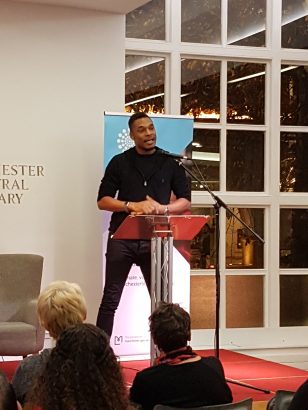 MLF Chapter & Verse
MLF Chapter & Verse
The Manchester Literature Festival Blog
Review: Terrance Hayes
Our Young Digital Reporter Ruth Jones is magnetised by Terrance Hayes’ political poetry.
Stepping out of the cold October evening air and into the bustling Manchester Central Library would make anyone excited to hear such an innovative poet’s new collection. The room was packed with people of all ages, buzzing with conversation and the anticipation of hearing Terrance Hayes in what will be his most extensive period reading in the UK.
As energetic as the room was, when I arrived and took my seat an immediate silence fell as the host Kayo Chingonyi took to the stage. When Terrance himself ascended the stage however, his easy humour and relaxed nature took away the tension, while his natural magnetism in reading continued to hold our undivided attention.
While this event centred on Terrance’s new collection, American Sonnets for My Past and Future Assassin, a 70-poem collection written in the first 200 days of the Trump administration, he was not the only poet whose poems were heard and whose spirit was felt. Similar to the way his new collection opens with a quote by Wanda Coleman, Terrance began the event by reading one of her sonnets, stressing Coleman’s importance to him and to the literary world in general throughout the discussion. Terrance expressed how he wanted to channel her energy at the very start of his readings, to inform how he read the rest of his work, as their friendship was so important to him and he was frustrated that her work is not as widely recognised as it should be. He explained to us that she was sure that she would be forgotten, but her work has endured, and she gave him the licence to ‘tap into my essential self’.
Following on, Terrance then read the first 14 sonnets from his new collection, taking the audience on an emotional journey through political oppression, racial discrimination, music, and the facial elasticity of James Baldwin. To finish the readings, Terrance read the index of the book, which he described as ‘trying to be a poem’; the first line of each sonnet tying the collection together and echoing the major themes.
In the following discussion, Kayo questioned Terrance about the figure of the assassins in his work, as well as the spirit of play in his style. Terrance talked about how he wrote sonnets, love poems, to his assassins, as ‘records of my raptures’. In spite of the fact that ‘America is trying to kill me’, he explains, you can still see the monsters as human and figure out how to be compassionate. In terms of the playfulness and repetition in his work, Terrance describes how he has ‘a good memory but a better imagination’, in that he can explore the pain of history in his work but maintain a playful side that imagines different possibilities and a better future. Terrance believes that play is connected to risk, cleverness and urgency, and that by using these factors poetry taps into what is necessary for survival.
Prompted by a question from a member of the audience, and bringing the discussion full circle, Terrance finished by discussing how we can combat the ‘invisibility’ of black female voices such as that of Wanda Coleman. Terrance brought it back to imagining a better future, while contesting history with our actions; referencing when we’re influenced by these women, and of course, reading as widely as we can.
